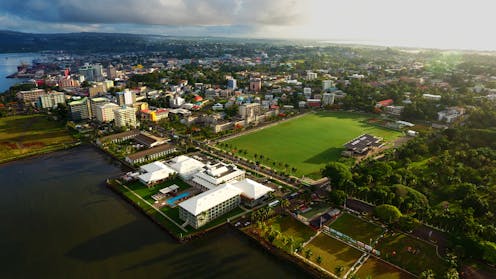
- Honorary Research Associate, Te Kunenga ki Pūrehuroa – Massey University

Drug cartels selling drugs in NZ and Australia are using Fiji as a waypoint – where kids as young as nine are being treated for meth addiction, while crime and HIV rates are climbing. What can be done?

The new government is likely to increase the numbers of workers coming to New Zealand on seasonal work schemes. But the impact on Pacific economies and communities is now too great to be ignored.

Big resorts, cruise ships and visitor numbers are all up for debate across the Pacific, but economic pressure may test how post-pandemic reality lives up to the sustainability rhetoric.

Australian and New Zealand demand for seasonal workers is having a major impact on Pacific nations’ economies. It will be a hard cycle to break.

Fiji is open for tourists but visitors need to be careful not to add extra strain to the country’s already struggling health system.

When Pacific Forum economic ministers meet today in Vanuatu, the region’s troubled airline sector should be high on their agenda.

Despite losing jobs, many Fijians in tourism-dependent areas reported greater well-being during the pandemic. As tourists return, what are the lessons?

With tourism operators desperate for the return of international visitors, the industry’s challenge now is to build a new, sustainable model.

New Zealanders are increasingly concerned about the state of the environment, but
many don’t feel a strong enough connection to nature to become involved in conservation projects.

Desperate for visitors to return, tourism-reliant Pacific nations are racing to re-open borders before Christmas. But will tourists feel safe enough to travel?

With COVID-19 surging and the state resisting a lockdown, Fijians turn to ‘solesolevaki’ — working together for a common cause — to fill the gaps.

Mainstream academic publishing presents many obstacles to Indigenous authors, especially the conventional peer review process — but there are ways to overcome this.

Research reveals a desire by Pacific tourism workers for genuine change once travel starts again, including better wages and conditions and greater local control of operations.

A reliance on local customary knowledge and practices helped people make a living and strengthened relationships with family and friends.

Pressure is growing to include struggling Pacific nations in an Australia-New Zealand travel bubble, but economic diversity is what the region really needs.
Contact Apisalome for
- General
- Media request
- Speaking request
- Consulting / Advising
- Research collaboration
- Research supervision
- Palmerston North
- Website
- @FijiApi
- Article Feed
- ORCID
- Joined

